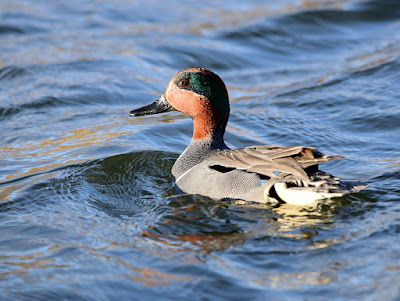 |
| Green-winged Teal / Photo: Tom Koerner/USFWS |
- One of the largest breeding colonies for Emperor Penguins has been empty for the past several years. A nearby colony has grown, but not enough to account for the missing penguins. The incident is a reminder that some penguin species will be hit hard by climate change.
- Geolocators are revealing details of the incredible migratory journeys of Blackpoll Warblers.
- A small population of non-migratory Northern Saw-whet Owls in British Columbia appears to be in the process of becoming a separate species.
- Technology used to support the Kakapo recovery program include feeding stations designed to be opened by specific birds.
- A study combined eBird and radar data to estimate the number of birds crossing the Gulf of Mexico during spring migration.
- Female Seychelles Warblers live longer when they have help raising offspring from other warblers.
- Natural England has stopped allowing the free killing of certain bird species like crows and woodpigeons and will soon require licenses for doing so. The change was the result of a campaign and legal challenge by conservation groups.
- The Meadowlands Nature Blog: Don Torino’s Life in the Meadowlands: When Birds Say Goodbye
- Backyard and Beyond: City Nature Challenges
- Laura's Birding Blog: Sharp-tailed Grouse
- MaghrebOrnitho: Ancient DNA confirms Slender-billed Curlew is a valid species
- Mia McPherson's On The Wing Photography: How I Know That This A Vesper Sparrow
- Puritan Tiger Beetles are being reintroduced to a site along the Connecticut River in an attempt to ensure that the species survives.
- The Lummi Nation in Washington wants to start feeding stations for orcas to keep the local population from starving to death.
- A camera trap study intended to monitor birds found a threatened mammal community in Peru.
- Two endangered bumblebees were spotted in Calgary's bee corridor.
- Great White Sharks have a reputation as fearsome predators, but they appear to be afraid of Orcas.
- Some millipedes can be identified by the color that their genitals glow under ultraviolet light.
- A new species of brome grass was discovered in Spain.
- A draft U.N. report suggests that a million species are at risk of extinction from human activity, due to a variety of causes.
- In the past week there have been a series of Extinction Rebellion protests to push governments to take action on the climate and biodiversity crises. Here are statements from some of the participants.
- In honor of Earth Day, LitHub published lists of book recommendations on climate change and related issues in four posts: The Classics, The Science, Fiction and Poetry, and The Ideas. (The Revelator also posts monthly environmental book recommendations; here is the one for April.)
- Melting permafrost could increase the costs of climate change by $70 trillion, with much of the additional cost likely to fall on poorer countries.
- Air pollution in the U.S. is being worsened by climate change, partly because of more intense wildfires.
- The U.S. media (especially on television) needs to be better at covering climate change.
- The Trump administration's attempt to expand offshore drilling in the Arctic and Atlantic appears to be dead, for now at least.
- The Blackfeet Nation is trying to open its own national park that would be adjacent to Glacier National Park in Montana.
- Residents in countries where China is investing in infrastructure prefer solar energy to coal (even when coal is favored by their governments).
- A recent survey showed that views of wildlife management are changing in the U.S. Fewer people support predator control or see animals as intended for human benefit.
- Proposed hydropower projects threaten the last free-flowing rivers in Central America and the people and fish they support.
- The Interior Department's advisory panel for Bears Ears National Monument includes no one who supported the monument designation.
- Endangered salmon died at a fish passage that was supposed to help save them in California.
- Climate change is visible even in the changes to individual trees.
- A shad was found this week in the Paulins Kill, a sign that removal of the Columbia Dam will be successful at restoring migratory fish.



